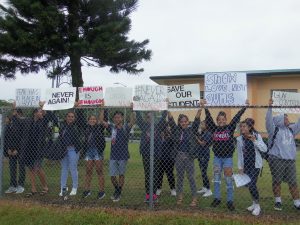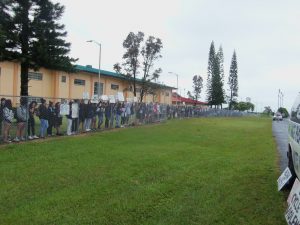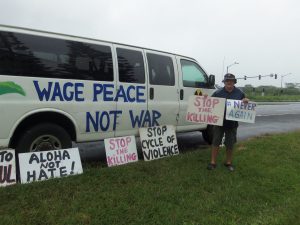 Junior Nigel Wallace comforts freshman Aleyana Pina during a student walkout to protest gun violence in schools and demand new gun control laws at Cambridge Rindge and Latin School in Cambridge, Massachusetts, on March 7, 2018. (Photo: Craig F. Walker / The Boston Globe via Getty Images)
Junior Nigel Wallace comforts freshman Aleyana Pina during a student walkout to protest gun violence in schools and demand new gun control laws at Cambridge Rindge and Latin School in Cambridge, Massachusetts, on March 7, 2018. (Photo: Craig F. Walker / The Boston Globe via Getty Images)
As a longtime grassroots organizer and direct-action trainer, I have heard from multiple parents, in the past few days, asking me about what their children will be up against as they participate in the #NeverAgain walkouts this week. As most of us have read, some students will be treated gently by administrators, who have more or less decided to go with the flow. Some students, however, may face consequences for walking out. Many have already been menaced by saber-rattling administrators with consequences ranging from suspension to arrest. The threat of some potential penalty for participating in protest is nothing new, but for many students, this is a first-time experience, so I have decided to share some thoughts and advice for young people who may be walking out.
So, You’ve Been Told You’ll Get Into Trouble
Some students have been told, in no uncertain terms, that anyone who walks out as part of a protest will be punished. Some school administrators have outlined specific punishments, while others have left students wondering. I have seen numerous outraged parents on social media, threatening to involve the ACLU if students are punished for exercising their “right to protest.” I am glad these parents are being supportive of their children, but it’s important to keep in mind that if the punishment is within the school’s normal disciplinary code (check your student handbook), and a student has, in fact, broken the rule in question, the ACLU is not going to stave off that suspension. I’m not saying that’s a reason not to walk out, but I am saying: Be ready to absorb the consequences of your actions. Don’t expect the system to see the light, cut you a break, or dismiss the rules because of some higher law regarding free expression. As someone who has organized protests for many years now, I can tell you, that’s not how any of this works.
In broad terms, people have a right to protest. But students don’t have a legally protected right to leave school in protest of anything. Defiance for the sake of justice usually costs something. I am not saying students shouldn’t dodge those consequences, if they can, or that parents and students shouldn’t talk administrators out of punishing students who protest whenever possible. Do that. But let’s also talk with young people who are new to all of this about the fact that protest doesn’t just happen when everyone’s on your side and you’re being offered a hall pass. Most movements aren’t received that way at all.
Even students at schools where no one will be penalized should understand that there will be schools where no exemption from discipline is offered, and that in protest, exemption from discipline is rarely a thing. Students who are exempt from punishment should not exempt themselves from discussion of what it means to issue a call to action, to answer one, or to be in solidarity with others, for whom the ask may pose a risk.
Make sure that everyone has a legal plan: If something unthinkable happens, and someone goes to jail, who gets called? Have a plan for that. If the punishment handed down is inordinate and ridiculous, and simply must be fought, who contacts an attorney, and what attorney will they contact? It’s good to have those bases covered, if you can. And if the situation feels very risky (for example, if the proposed punishment is excessive and potentially damaging), have real conversations with one another about who is most at risk (due to existing disciplinary status, institutional anti-Blackness, and other possible factors), and what could be done to insulate the most vulnerable participants.
As someone who has absorbed numerous consequences for disobedience in protest, including arrest, I can tell you, it’s important to be ready. Know what you are getting into. Direct action means stepping outside of society’s preset solutions — solutions that have already failed your community. That’s a challenge to authority, and to the validity of the system itself, as it makes clear that the recourse you were freely given was not genuine. The paths you were told to take to solve your problems are actually closed, or have been politically rerouted by the powerful into insignificance. This is why we protest — because it is the only meaningful path open to us under the unjust conditions we are faced with. In taking such action, I believe a person should know the risks they are facing, take personal responsibility for knowing those risks, and act if they feel that the necessity of the action outweighs the risk. I cannot tell you if that’s the case in any of your given situations. Only your beliefs, your conscience and your knowledge of your circumstances can tell you if the urgency of the moment demands that you take a risk.
When You Protest
Move as a group. Numbers don’t always afford safety, but they do afford power. If you have a lot of people, don’t let your group get stretched out. Don’t have stragglers who could be hassled out of view. Don’t have people jetting out ahead who could be grabbed up as an example to the rest of the group, in an effort to stop your procession. If they want to confront you, make them confront everyone, together.
Any imagery your event generates in the media and on social media will also be more powerful if your group moves in a tight formation, making your unity clear for all to see.
I have no experience dealing with school resource officers, specifically, as they pertain to protest, but I would say a lot of the same rules apply as in street protests, because whatever title police in schools are assigned, they are, in reality, still police. Have a buddy — that way no one is identifiably vulnerable for being on their own, and there is a witness to whatever each person experiences. Make agreements with your co-organizers about what to say/do if confronted by a school resource officer. This is not a decision you want to be making on the spot. If you need to respond to an officer, have a canned response that everyone has agreed to, like “We will be going outside for 17 minutes and then returning.” That’s it. No flourish. No arguing. If you are detained, hand over your school ID and shut your mouth. If they are detaining you, they may be treating the protest as criminal, which means anything you say can be used against you and your friends. They may act as though their questions come from a place of agreement or understanding. Know that’s not real and stick to your plan of minimum communication.
Know your tone. Is your event solemn? Is it angry? Have some intention about that and encourage your classmates and co-organizers to hold one mood together. If your event is too scattered, you lose control of your narrative. Encourage participants to take the matter seriously. No goofing off. Personally, I would try to keep a serious expression at all times. People who are photographed laughing and smiling in serious protest situations are often used to discredit the seriousness of an event or issue. Don’t play into that. If the group’s shared mood or behavior falters, words or songs that are spoken or sung collectively can be a good way to reel people back into a shared mode.
Read Up
There’s a lot of good material out there on the legal, ideological and pragmatic aspects of protest. For those getting pushback, I highly recommend, “White People Hate Protests,” a zine by Mariame Kaba that makes clear that the popular embrace of past movements is largely grounded in our society’s need to subsume those movements, rather than allow for any sense of historical momentum. Movements that truly undermine the status quo are rarely popular when they occur, regardless of what people claim decades later.
I also recommend the zine “Why Protest,” which provides some relevant thoughts and inspiration about why we take action in general. I would actually suggest printing out copies of “Why Protest” to share with your classmates on Wednesday or thereafter. It’s that good.
If you are part of a walkout about gun control, read up about guns and gun laws. Don’t settle for talking points. Be able to discuss your own informed thoughts. There’s a lot of legal history around gun legislation, and there’s a lot that may matter to you that doesn’t matter to adults who have shaped the gun control narrative over the years. This is not the Democrats’ moment. It’s your moment. Let your exploration of the facts and the ideas at work inform it.
Make sure your demands reflect your values and desired outcomes. If your demands aren’t in lockstep with the demands being made at other schools, that’s OK. Some of the more unique demands that students who are walking out have made involve the development of alternative forms of conflict resolution in their schools, such as transformative justice programs, to create a more just and healing environment when harmful dynamics arise the first time. That’s a good thing.
In solidarity with those who have already been organizing, read up on what groups have been leading protests in your area in recent months in years. What are they fighting for? Why? Had you heard about them before? If not, ask yourself why, and what forces might be at work. While people tend to have their favorite examples of youth protest — examples that tend to rest firmly in the past — there is incredible youth organizing that’s gone on in very recent times that many have yet to hear of. Black youth in Chicago, for example, won a trauma center for the city’s underserved South Side, but it took a lot of direct action and defiance to make that happen.
Lastly, read up on your school’s disciplinary code and on local protest laws. Acts of righteous indignation should be well informed.
If You Don’t Walk Out
Maybe you’ve decided to sit this one out. Maybe your protest was somehow thwarted. Maybe you settled on a compromise with administrators — an assembly of some kind that isn’t what you had in mind but will address the issues you wanted to discuss. Here’s what you need to remember: Organizing an event can be a very good thing, but if you want to change the world, organizing one event is just one small step in a much larger process of taking action, building culture and building community for the sake of change. And while your principal, the police, or your own circumstances may derail your participation in a singular event, community and culture are something you can build every day through the relationships you develop with others, and through the dialogues and activities you undertake. No principal has the power to stop that, and that’s a beautiful thing.





